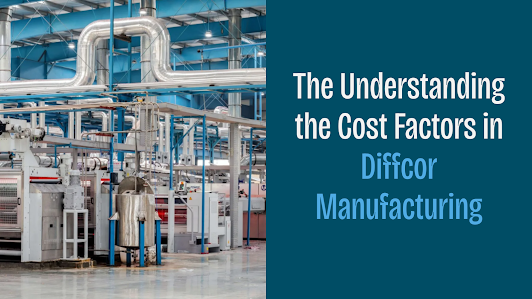The Understanding the Cost Factors in Diffcor Manufacturing
In today’s rapidly evolving industrial landscape, cost management
plays a pivotal role in maintaining competitive advantage. One such area where
cost scrutiny is essential is in Diffcor manufacturing. As an
advanced corrosion-resistant alloy used in demanding engineering applications,
the production and supply of Diffcor
involve several complex factors that influence the final cost to businesses.
Raw Materials
and Alloy Composition
The very first cost driver in Diffcor manufacturing is the
quality and availability of raw materials. Since Diffcor is engineered to withstand extreme wear, heat, and
corrosive environments, it often incorporates high-grade elements like
chromium, nickel, and molybdenum. The fluctuating global prices of these
materials can significantly impact manufacturing expenses. Diffcor suppliers must stay
abreast of market trends to offer competitive pricing, while also ensuring that
quality is never compromised.
Manufacturing
Processes and Technology
The production of Diffcor
involves sophisticated metallurgical techniques. Processes such as vacuum arc
remelting, precision casting, and advanced heat treatments require highly
specialised equipment and skilled labour. These advanced technologies add to
the overheads in Diffcor manufacturing,
particularly in ensuring that the final product meets stringent industrial
standards.
Another layer of complexity is added when manufacturing tailored
solutions for niche applications. Custom shapes, sizes, or performance
enhancements demand additional time and resource investments, pushing up
overall costs. Leading Diffcor manufacturers often invest
in cutting-edge technology and innovation to streamline production without
sacrificing quality.
Labour and
Expertise
Manufacturing Diffcor
isn't a generic process. It demands a highly skilled workforce trained in
advanced material sciences and engineering principles. Recruiting and retaining
such talent increases labour costs. Furthermore, continuous training is
essential to keep pace with innovations and ensure safety and efficiency
throughout the production process.
Some of the most trusted Diffcor manufacturers collaborate
with organisations like Diffusion
Engineers, who bring decades of experience in specialised welding and
fabrication. Their expertise ensures high precision in application, though it
also adds a premium to the cost.
Quality
Control and Compliance
Another often-overlooked cost factor is quality assurance and
regulatory compliance. Since Diffcor
is commonly used in critical sectors such as oil & gas, power generation,
and heavy engineering, it must comply with international quality and safety
standards. Extensive testing, documentation, and certification processes incur
additional expenses. Failure to meet these standards can result in costly
recalls or operational failures, which makes stringent quality control an
essential, albeit costly, step.
Collaborating with reliable Diffcor
suppliers helps manufacturers ensure traceability and consistent quality,
which in turn justifies the cost to clients who depend on uncompromised
performance in demanding environments.
Logistics and
Distribution
Shipping heavy-duty industrial materials like Diffcor products is not without challenges. Specialised packaging,
storage conditions, and transportation logistics all contribute to the final
cost. For international orders, tariffs, taxes, and customs clearance fees must
also be accounted for. Strategic partnerships with trusted Diffcor suppliers help to
optimise these logistics and ensure timely delivery without unexpected
financial surprises.
Collaboration
and Innovation
Companies like Diffusion
Engineers play an important role not just in manufacturing but also in
R&D. Their work in developing newer applications and improving existing
alloy performance adds long-term value to the Diffcor manufacturing ecosystem.
These innovations may increase upfront costs but often deliver superior
lifecycle performance, leading to better ROI for end users.
Final
Thoughts
Understanding the various cost factors in Diffcor manufacturing is essential for procurement managers, engineers, and business leaders alike. From raw materials to regulatory compliance and from expert collaboration to logistics, every stage in the supply chain contributes to the final price tag. However, investing in high-quality Diffcor from trusted Diffcor suppliers ensures durability, safety, and long-term value—qualities that far outweigh the initial cost.




Comments
Post a Comment